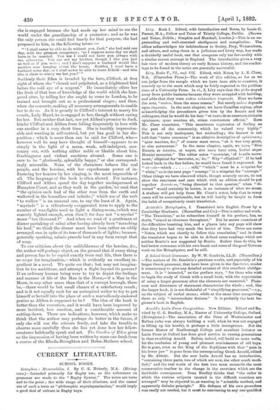Livy, Books V., VI., and VIL Edited, with Notes, by
A. R. Cluer, BA. (Clarendon Press.)—The work of this edition, as far as we can judge from the sample which we have been able to examine, is scarcely up to the mark which may be fairly expected in the publica- tions of a University Press. In vi, 5, Liu says that the plebs stayed away from public business because they were occupied with building, and adds that they were eodem exhaustam impensis. Here we have the note, "eodem, from the same reason.". But surely eodem depends upon impensis. In the next chapter, we have Camillus saying, after acknowledging the precedence given him by the Senate and his colleagues, that he would do his best " nt tante de se consensa civitatis opinionem, quae maxima sit, etiam constantem efficiat." Here Mr. Muer translates, "This unanimous expression of feeling on the part of the community, which he valued very highly." This is not only inadequate, but misleading; the learner is not told that " tante consensa " is an ablative descriptive of opinionem; "quae maxima, Fze.," of course must mean, "as it was very great, so also permanent." In the same chapter, again, we have, " Sive Etruria se interim, ut nuper, sive nova haec curs, Latiui atque Hernici moverint." The editor notes "moverint, of hostile move- ment,' elliptical for 'moverint, se,' &c." Why "elliptical ?" If he had looked back to the line before, he would have found it expressed. In "tit—sic—which still," "which" must be a misprint for "while," as in the next page "courage " is a misprint for "carnage." Other things we have observed which, though scarcely errors, do not show the exactness and care which with an edition should be put together Aversis eo, "being directed to that quarter," when " di- verted" would certainly be better, is an instance of what we mean. A student will get help from Mr. Cluer's notes, help that in many cases will be unexceptionable, but he will hardly be taught to form the habit of scrupulously exact translation.














































 Previous page
Previous page